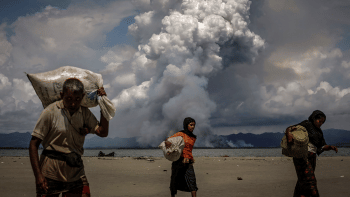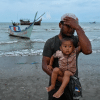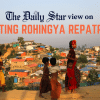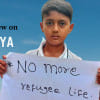My life in the Rohingya camp

For the last six years, I've been living in the world's largest refugee camp – Kutupalong in Cox's Bazar – with my family. However, it didn't have to be like this. My village had everything I wanted: a school, mosque, and all other essentials. But unfortunately, there was no option for 12-year-old Moshowraf but to escape Myanmar to survive.
Since 1978, the Myanmar government has been persecuting my community, with the mission to remove us from the place we've been calling home for centuries. In this brutal process, it has erased our fundamental rights. We, the Rohingya, were not even allowed to visit another village without an official recommendation letter, and the opportunity for higher education was snatched away. Discrimination in every sphere of life was the norm.
This terrible situation culminated on August 25, 2017. At the dead of night, when my family and I were sound asleep, the Myanmar military encircled my village and arrested all the villagers. In the morning, the military and Rakhine mobs started burning our houses, markets and mosques – looting valuables along the way. They killed the arrestees, raped and murdered the women, and didn't even spare the babies. They did all this right in front of the victims' loved ones.
It was the most horrible day the community had ever witnessed.
Nowhere was safe for us, and so, we had to escape to Bangladesh to save our lives. Words cannot do justice to the harrowing events my family and I went through during the journey. We crossed high hills, great forests and unknown lands to reach the border. We didn't eat for seven days, and I had to see children and the elderly dying from starvation and dehydration. In those seven days, I felt like half my life went by.
At one point, we reached the river between Bangladesh and Myanmar. With the help of some Bangladeshis, we reached the refugee camp on a raft and have been living here ever since.
All over the world, I see students reaching great heights through education – and I feel sad thinking about the future of Rohingya people living in the camps, unable to pursue their dreams. If we stay here for a long time, without any opportunities, we will become hopeless. No one here is living a happy and peaceful life. I always long to go back to my country, Myanmar – but with full rights. In these six years, however, we have not been given any solution to return with dignity and security.
Every person wants to be something in life, and I'm no different. All throughout childhood, my dream was to be an engineer – but as the days keep passing in the camp, that dream is slipping away. After finishing my studies, I really want to help my community restore the peace we once enjoyed, but there are no facilities here for higher education. With little opportunities, many of the youths are just wasting time in the camps, while others have to work to support their families.
In the camp, every single day feels like a year. We live in makeshift shelters made of bamboo and tarpaulin, which offer little protection from the elements. The world's largest camp is still congested due to the overwhelming number of people. We lack clean water, and there aren't enough sanitation facilities. There are limited healthcare facilities in the camp, as the establishments remain overcrowded and understaffed. Additionally, there is no safety and security for us; unknown gangs who create conflict rob us of our sleep.
Still, with my parents' encouragement, I'm doing everything I can to pursue my dream. I've just finished 10th grade at a community school, and I'm taking courses on Science Literacy and Foundation of Academic Writing on an online platform. My days go by attending classes and doing homework. I'm also into extracurricular activities such as sports, competitive exams, art and music to stay positive and boost my creativity and critical thinking.
I've found solace in reading. It allows me to find escape through different worlds and characters, expand my understanding of various topics, develop my critical-thinking skills, and it acts as a relaxing activity that helps me unwind. My favourite novel is One Hundred Years of Solitude, because it is about a family that faces numerous challenges and upheavals, including war and political struggles – similar to my plight.
All over the world, I see students reaching great heights through education – and I feel sad thinking about the future of Rohingya people living in the camps, unable to pursue their dreams. If we stay here for a long time, without any opportunities, we will become hopeless. No one here is living a happy and peaceful life. I always long to go back to my country, Myanmar – but with full rights. In these six years, however, we have not been given any solution to return with dignity and security.
On the sixth anniversary of the horrible events that forced us to flee Myanmar, I'm asking everyone in the world to provide formal education opportunities for Rohingya students like me. I request that you keep us visible in the eyes of the world, so that we can return to our own country, with our rights.
Mohammed Moshowraf is a Rohingya refugee, originally from Maungdaw township in Rakhine state, Myanmar.

 For all latest news, follow The Daily Star's Google News channel.
For all latest news, follow The Daily Star's Google News channel. 












Comments